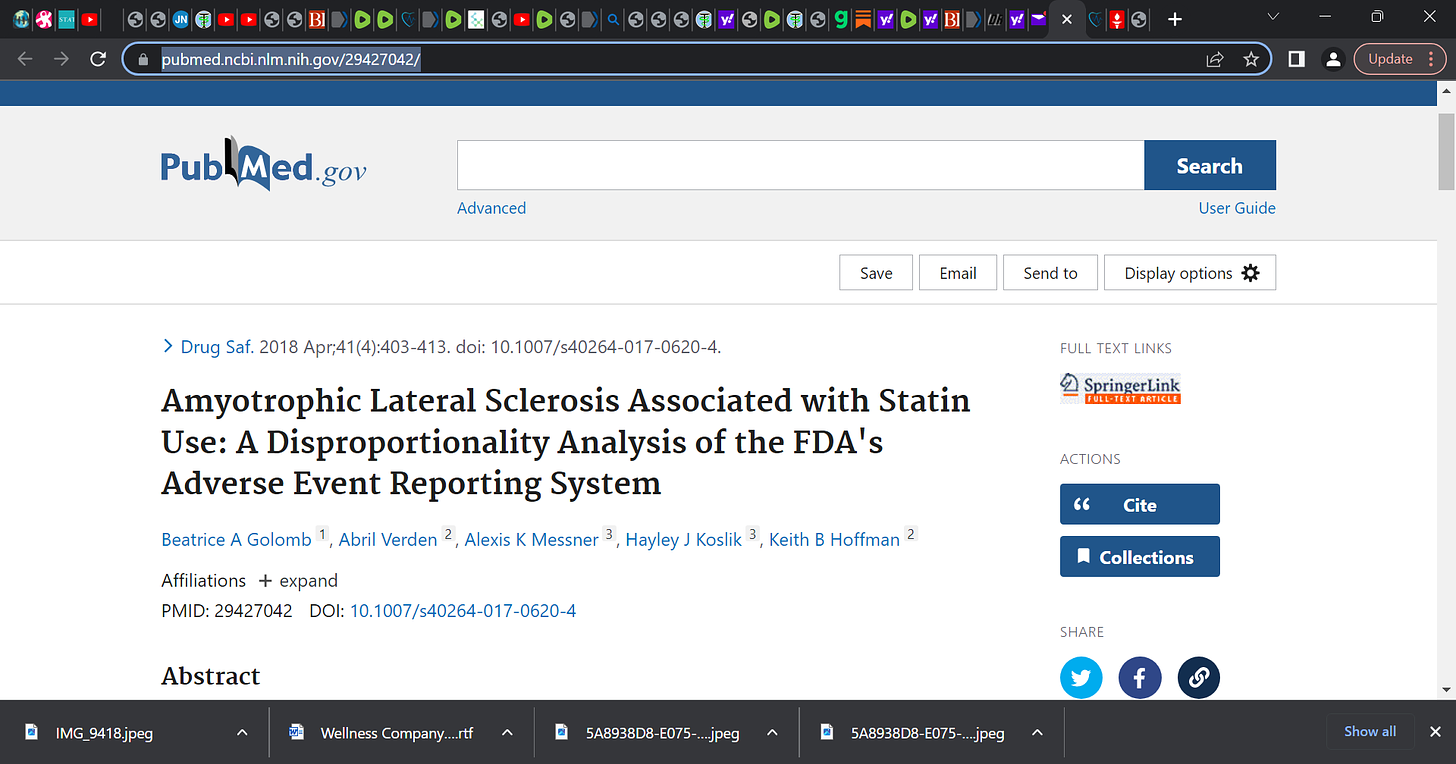Golomb et al.: "Amyotrophic Lateral Sclerosis Associated with Statin Use: A Disproportionality Analysis of the FDA's Adverse Event Reporting System"; odds-ratios for ALS were elevated for all statins
RORs for ALS were elevated for all statins, with elevations possibly stronger for lipophilic statins. RORs ranged from 9.09 (6.57-12.6) and 16.2 (9.56-27.5) for rosuvastatin and pravastatin
Drs. Urso, Oskoui, and Brinkley are engaging in a very interesting discussion and I wanted to share this study on the very troubling link between ALS and statin use:
‘Findings extend previous evidence showing that significantly elevated ALS reporting extends to individual statin agents, and add to concerns about potential elevated occurrence of ALS-like conditions in association with statin usage.’
SOURCE:
https://pubmed.ncbi.nlm.nih.gov/29427042/
‘Introduction: Apparent elevations in reporting of amyotrophic lateral sclerosis (ALS)-like conditions associated with statin use have been previously described from data obtained via US and European databases.
Objective: The aim of this study was to examine US FDA Adverse Event Reporting System (FAERS) data to compare reporting odds ratios (RORs) of ALS and ALS-like conditions between statins and other drugs, for each statin agent.
Methods: We assessed for disproportional rates of reported ALS and ALS-related conditions for each statin agent separately by using the ROR formula. FAERS data were analyzed through September 2015.
Results: RORs for ALS were elevated for all statins, with elevations possibly stronger for lipophilic statins. RORs ranged from 9.09 (6.57-12.6) and 16.2 (9.56-27.5) for rosuvastatin and pravastatin (hydrophilic) to 17.0 (14.1-20.4), 23.0 (18.3-29.1), and 107 (68.5-167) for atorvastatin, simvastatin, and lovastatin (lipophilic), respectively. For simvastatin, an ROR of 57.1 (39.5-82.7) was separately present for motor neuron disease.
Conclusion: These findings extend previous evidence showing that significantly elevated ALS reporting extends to individual statin agents, and add to concerns about potential elevated occurrence of ALS-like conditions in association with statin usage.’





I've been wondering why we keep hearing about so many cases of this "very rare" disease (ALS) in recent years.
P.S. My doctor prescribed atorvastatin about 7 years ago. Over 3-4 weeks I became very weak and achy, and was losing my mental sharpness. It took great effort to get out of bed in the morning. I didn't know what was happening to me until I saw an ad for a TV attorney looking for clients in a class action lawsuit against statin manufacturers. I had EVERY listed symptom. I immediately called my doctor and stopped taking the statin. The doctor now says I have unusually high "good" cholesterol for "genetic reasons" and I don't need the statin. This was my first indication that something very fishy was happening. (I was back to my energetic self in less than 2 weeks after stopping the statin.)
i've known this for years. there is a small book Lipitor, Thief of Memory by Dr. Duane Graveline which i bought (amazon tells me on 3/20/09) and gave to my father. Dr. Graveline started having TIAs after statin use. i later read a stock tip, encouraging investment in the only drug at the time used to slow (a bit) the progression of ALS, the numbers of which were expected to rise due to wide statin use (yes, the tip actually said that).
my father also read a short article in his AARP magazine about a woman with ALS who had rigged her ipad as a communications device which was apparently far more effective than the cumbersome machinery insurance would cover. "i wonder if she's taken statins?" he asked and urged me to find her. using the clues in the article, i located her through her local ALS chapter and sent her an e-mail on my father's behalf. she responded that yes, there was a suspicion.
i also somewhere read an article by a man who had ALS and was planning to kill himself before things got so bad that he lost the ability to. i tracked him down and we had a brief e-mail correspondence. he had lived in japan for a time and took pride in his exceptionally low cholesterol. i told him his levels were too low and to please add some good fats into his diet. his last e-mail to me was a thank you and a good bye and an acknowledgement that statins were suspect; he forwarded me a copy of a newspaper article on the subject.
my father always refused statins. hospitals and nursing homes tried to force them on him continually. the nurse would bring the statin every night and every night my father would turn it down, until i suggested to the nurse that the rejected pills better not appear on my father's medicare bill or i would report them for fraud. that triggered a visit from the doctor who tried to to argue with me, citing relative risk reduction stats. i had actually read the Jupiter study and could quote the absolute risk reduction plus the increased risks of diabetes, TIAs, etc. he walked away and my dad was never offered a statin again.
he also didn't stay there long. i lived with him until he died, 6 weeks shy of his 96th birthday, his mind still sharp, home in bed shortly after i had tucked him in for the night.
it comes as a shock to me that this connection isn't all common knowledge.